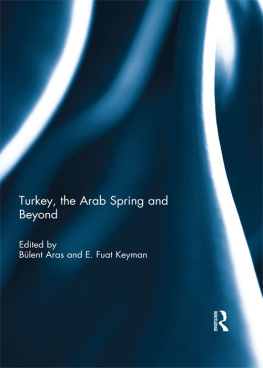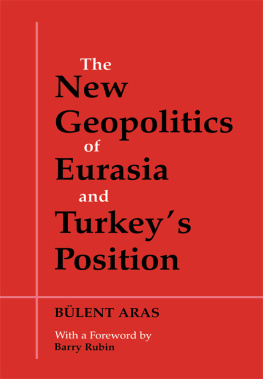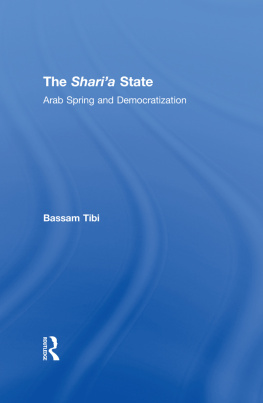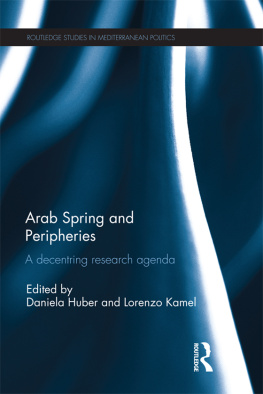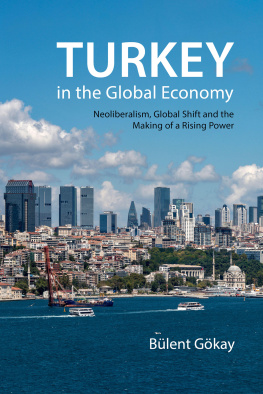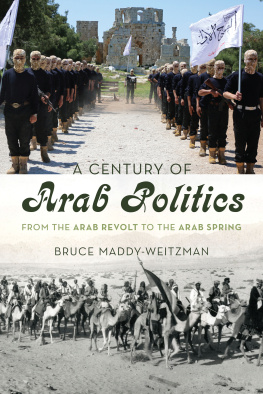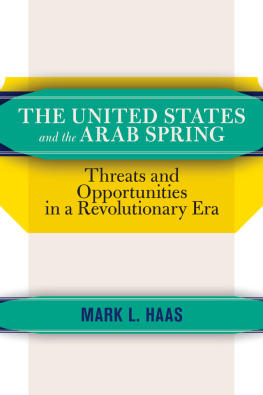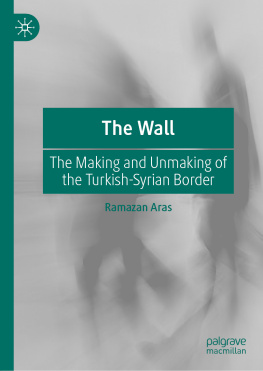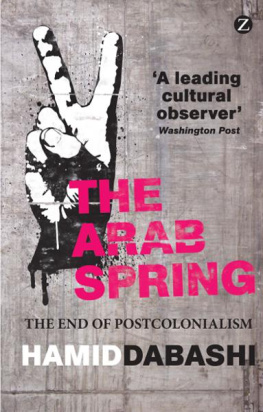Turkey, the Arab Spring and Beyond
It has been almost five years now since a new collective consciousness of Arab masses transformed the political landscape of the Middle East and North Africa. In just a short period of time, the people of the Arab world protested against their rulers, putting an end to long-time authoritarian leaders in Tunisia, Egypt, Libya, and Yemen, while bringing others to the eve of collapse. Although the uprisings were initially successful, the peoples strong will to see honour, dignity, rights, and good governance realized within their respective countries was fiercely combated by the ruling strata of these states and their strategies to ensure authoritarian survival.
The changing political landscape and the dynamic processes of the Arab Spring have caught the attention of academics as well. There is a blossoming literature being written on the Arab Spring focusing on social protests, authoritarian resilience and learning, opposition strategies, the rise of non-state actors, state failure, foreign policy, and the new geopolitical landscape. Therefore, with the desire to contribute to this literature, this edited volume aims to address the changing political atmosphere and the challenges of the emerging geopolitical order, particularly focusing on Turkish foreign policy and its response to the Arab Spring.
This book was originally published as a special issue of the Journal of Balkan and Near Eastern Studies.
Blent Aras is Professor of International Relations, Sabanc University and Global Fellow at Wilson Center. He was the head of the Diplomatic Academy and Center for Strategic Research at Turkeys Ministry of Foreign Affairs. His recent publications include War in the Gardens of Babylon: Middle East after the Iraqi War (2004), Turkey and the Greater Middle East (2004), and September 11 and World Politics: American Hegemony Reconsidered (2004).
E. Fuat Keyman is Director of the Istanbul Policy Center and Professor of International Relations at Sabanc University. Recent publications include Hegemony through Transformations; Democracy, Identity, and Foreign Policy in Turkey (2014), and Symbiotic Antagonism: Competing Nationalisms in Turkey (With Aye Kadiolu; 2011).
Turkey, the Arab Spring and Beyond
Edited by
Blent Aras and E. Fuat Keyman
First published 2017
by Routledge
2 Park Square, Milton Park, Abingdon, Oxon, OX14 4RN, UK
and by Routledge
711 Third Avenue, New York, NY 10017, USA
Routledge is an imprint of the Taylor & Francis Group, an informa business
2017 Taylor & Francis
All rights reserved. No part of this book may be reprinted or reproduced or utilised in any form or by any electronic, mechanical, or other means, now known or hereafter invented, including photocopying and recording, or in any information storage or retrieval system, without permission in writing from the publishers.
Trademark notice: Product or corporate names may be trademarks or registered trademarks, and are used only for identification and explanation without intent to infringe.
British Library Cataloguing in Publication Data
A catalogue record for this book is available from the British Library
ISBN 13: 978-1-138-64306-2
Typeset in Minion Pro
by RefineCatch Limited, Bungay, Suffolk
Publishers Note
The publisher accepts responsibility for any inconsistencies that may have arisen during the conversion of this book from journal articles to book chapters, namely the possible inclusion of journal terminology.
Disclaimer
Every effort has been made to contact copyright holders for their permission to reprint material in this book. The publishers would be grateful to hear from any copyright holder who is not here acknowledged and will undertake to rectify any errors or omissions in future editions of this book.
Contents
Citation Information
The chapters in this book were originally published in the Journal of Balkan and Near Eastern Studies, volume 17, issue 3 (September 2015). When citing this material, please use the original page numbering for each article, as follows:
Chapter 1
Introduction to the Special Issue: Turkey, the Arab Spring and Beyond
Blent Aras and E. Fuat Keyman
Journal of Balkan and Near Eastern Studies, volume 17, issue 3 (September 2015) pp. 249251
Chapter 2
Mediation as a Foreign Policy Tool in the Arab Spring: Turkey, Qatar and Iran
Pnar Akpnar
Journal of Balkan and Near Eastern Studies, volume 17, issue 3 (September 2015) pp. 252268
Chapter 3
Reform and Capacity Building in the Turkish Foreign Ministry: Bridging the Gap between Ideas and Institutions
Blent Aras
Journal of Balkan and Near Eastern Studies, volume 17, issue 3 (September 2015) pp. 269285
Chapter 4
Practical Geopolitical Reasoning in the Turkish and Qatari Foreign Policy on the Arab Spring
zgr Pala and Blent Aras
Journal of Balkan and Near Eastern Studies, volume 17, issue 3 (September 2015) pp. 286302
Chapter 5
The Impact of the Arab Spring on the Gulf Cooperation Council
Larbi Sadiki
Journal of Balkan and Near Eastern Studies, volume 17, issue 3 (September 2015) pp. 303320
Chapter 6
Turkey and Iran: The Two Modes of Engagement in the Middle East
E. Fuat Keyman and Onur Sazak
Journal of Balkan and Near Eastern Studies, volume 17, issue 3 (September 2015) pp. 321336
Chapter 7
Turkish Foreign Policy towards the Arab Spring: Between Western Orientation and Regional Disorder
Emirhan Yorulmazlar and Ebru Turhan
Journal of Balkan and Near Eastern Studies, volume 17, issue 3 (September 2015) pp. 337352
For any permission-related enquiries please visit: http://www.tandfonline.com/page/help/permissions
Turkey, the Arab Spring and Beyond
Blent Aras and E. Fuat Keyman
It has been almost five years now since a new collective consciousness of Arab masses transformed the political landscape of the Middle East and North Africa. In just a short period of time, the people of the Arab world protested against their rulers, putting an end to long-time authoritarian leaders in Tunisia, Egypt, Libya and Yemen, while bringing others to the eve of collapse. Although the uprisings were initially successful, the peoples strong will to see honour, dignity, rights and good governance realized within their respective countries was fiercely combated by the ruling strata of these states and their strategies to ensure authoritarian survival. This dialectical struggle put an end to early optimist accounts and paved the way for speculations that the Arab Spring had come to an end. However, before we can speculate what a precise ending to the uprisings will look (or had looked) like, it must first be asked, what is the destiny of the Arab Spring?
The political landscape does not always present a clear or promising picture, however, the question of the destiny of the Arab Spring corresponds to some reality on the ground. On the one hand, there is a general consensus that the worst has yet to be seen. The rise of non-state actors, cross-border re-territorialization and the search for state-like entities, sectarian conflicts, proxy wars and state failure paint a bleak picture for the future of these countries. On the other hand, there is a new psychological threshold for resisting authoritarian rule and an emerging collective consciousness to change the political landscape for the betterment of political rights and good governance. Although it seems that there will be some challenging periods ahead, revolution is a difficult process, and it is certainly not over. The Arab masses have bridged the time lag between their authoritarian setting and current world realities, and they are not likely to accept anything less than what the rest of the world has asked for in terms of seeing international standards of human dignity and rights realized in their homeland.


